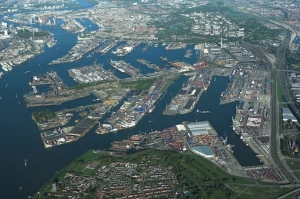


(Posted on 06/10/22)
The Port of Rotterdam Authority has developed four diverse global scenarios in detail to increase understanding of what the future might look like, so that the Port Authority can respond accordingly. What investments are needed to attract new freight flows, business and clean energy? Where should adjustments be made?
Central to these analyses was the issue of how changes in geopolitics, economics, society and technology would impact the port-industrial complex and the size and composition of the port's throughput. Will there be a global focus on ambitious climate action or will the energy transition stall? Will power blocks erect trade barriers to protect their own industries or will free trade be allowed to flourish? Do consumers prefer quality over price or the exact opposite?
The four scenarios towards 2050 and their corresponding concise story lines are:
Connected Deep Green: Effective global cooperation with acceleration on digital transparency in logistics chains and global commitment to targets to combat climate change, resulting in global carbon neutrality by 2050, broad prosperity and high economic growth and a maximum temperature rise of 1.5 degrees Celcius this century.
Regional Well-Being: From a shared commitment to transition, in the absence of sufficient global trust, a tilt towards a regional focus on clean and healthy environments, privacy and well-being emerges within clusters of countries by early 2030. This results in a deteriorating business environment for basic industry in Northwestern Europe and moderate economic growth.
Protective Markets: A world with distrust between power blocks, global geopolitical tensions and suboptimal integration in logistics chains. There are competing economic interests in a fragmented world with focus on self-sufficiency, financial prosperity, resilience and defence. No global carbon neutrality before 2100 and low economic growth.
Wake-Up Call: Increasing concerns about the economic impact of external shocks such as food and energy availability or extreme weather mark a turning point. There is growing awareness that strategic cooperation and rigorous measures are needed to reduce carbon emissions. This results in strategically strong EU policies, moderate economic growth and late but rapid transition to renewable energy.
The impact of each scenario has on throughput in the port of Rotterdam is summarised in the infographic below:
Allard Castelein, CEO of Port of Rotterdam Authority: "These latest estimates show that our portfolio will radically change in the next 30 years. The global scenarios help us to strengthen the position of the port-industrial complex in a targeted manner by focusing on sufficient production and processing capacity, good connectivity with key hinterland markets and accelerating sustainability."
Euroports has announced the renewal of the concession for Terminal Rinfuse Venezia (TRV) at Porto Marghera... Read more
Contributing to the commitment of achieving net zero emissions by 2050, the Panama Canal authority has... Read more
The Saguenay Port Authority in Quebec has ordered a Konecranes Gottwald ESP.6B Mobile Harbor Crane for... Read more
North Sea Port Supervisory Body has appointed Cas König as the port authority's new CEO. Kö... Read more
After 19 years at the helm of the Port of Trois-Rivières and a career rich in major projects,... Read more
Abu Dhabi based AD Ports Group, an enabler of integrated trade, transport and logistics solutions, has... Read more
The Port of Rotterdam and Port of Antwerp-Bruges have welcomed the Clean Industrial Deal, through which... Read more
The Canadian Port of Trois-Rivières is delighted to have received major funding of $87.1 million... Read more
Belgian logistics giant Katoen Natie has ordered four all-electric Konecranes Gottwald Mobile Harbor... Read more
AD Ports Group, Abu Dhabi based enabler of integrated trade, transport and logistics solutions, has... Read more